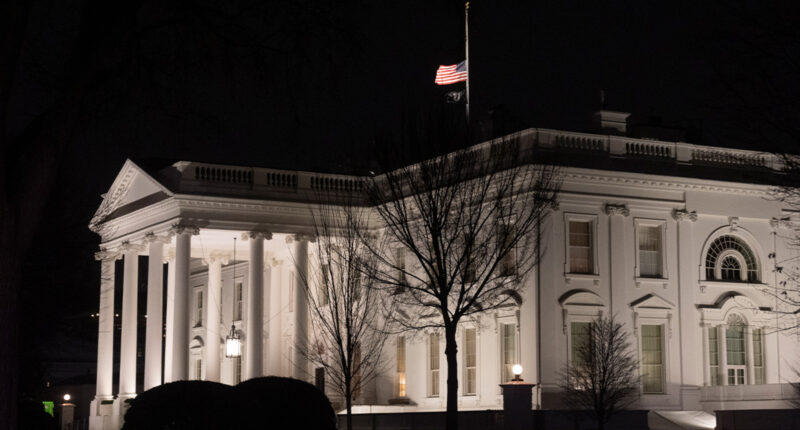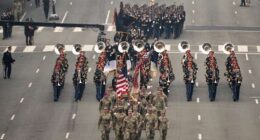President-elect Donald Trump has expressed frustration that flags will be flying at half-staff when he takes office later this month.
President Joe Biden took action to honor the late President Jimmy Carter, who recently passed away at the age of 100. This honorary gesture is not something that can be altered by Trump at this moment, as it was put into effect after Biden assumed office.
Here’s what to know about why flags are lowered when a president dies, who can issue that order and how long the process lasts:
Why are U.S. flags being flown at half-staff?
On Sunday, President Biden issued an order for all U.S. flags to be flown at half-staff in remembrance of the late former president, Jimmy Carter. Lowering the flag to half-staff is a sign of respect and mourning for the nation or a specific state.
According to the U.S. flag code, specific guidelines dictate the lowering of the U.S. flag to half-staff, including a designated 30-day period for honoring current or former presidents. This practice applies to federal government buildings, their surroundings, U.S. embassies, and other establishments overseas, such as military bases and vessels.
Flags can be lowered to commemorate the deaths of other officials, including the vice president, Supreme Court justices and members of Congress, although those periods aren’t as long.
Flags can also be ordered lowered in other circumstances, including a national tragedy or on Memorial Day.
Since U.S. flag code states that no flag should fly higher than the American flag on the same pole or nearby, state flags get lowered during those periods, too.
How long will flags be lowered?
According to Biden’s proclamation, U.S. flags will be lowered for 30 days from Carter’s death, until Jan. 28.
With the inauguration on Jan. 20, that means that flags will be at half-staff when Trump takes office and for the first week of his administration.
Who decides when to lower flags?
According to the U.S. General Services Administration, the president, a governor and the mayor of the District of Columbia can order U.S. flags to be flown at half-staff.
What has Trump said about flags being lowered?
On Friday, Trump posted on social media that “Democrats are all ‘giddy'” about the notion that flags will be lowered when he takes office as president.
“Nobody wants to see this,” Trump wrote. He added that “no American can be happy about it. Let’s see how it plays out. MAKE AMERICA GREAT AGAIN!”
Asked about Trump’s post at Friday’s briefing, White House press secretary Karine Jean-Pierre said Biden would not consider reversing or reevaluating the half-staff plans.
Can Trump decide to raise the flags?
Yes. U.S. flag code dictates that flags remain lowered for the 30-day period from the death of a former president. But that code isn’t mandatory, so once he becomes president, Trump could technically override it.
That’s what happened in February 1973, when then-President Richard Nixon opted to raise flags – which he had ordered lowered in mourning following the death of former President Lyndon Johnson – before the 30-day mark to honor the first American prisoners of war released from Vietnam. The hiatus only lasted a day, and flags went back to half-staff thereafter for eight days.
Flags had also been at half-staff when Nixon was sworn in for his second term in January 1973, due to Nixon having ordered them lowered after the death of former President Harry S. Truman.
Has Trump taken issue with lowering flags before?
Yes. After the death of Arizona Republican Sen. John McCain – with whom Trump had a fractious relationship – in 2018, the Stars and Stripes were briefly lowered to half-staff over the weekend but went back up to full height the following Monday, while flags at the U.S. Capitol and elsewhere stayed at half-staff.
The flag was lowered again to half-staff after complaints from people in both the Republican and Democratic parties. Former presidents spoke at McCain’s funeral, but the senator’s family made clear they did not want Trump to attend.
Copyright © 2025 by The Associated Press. All Rights Reserved.

















